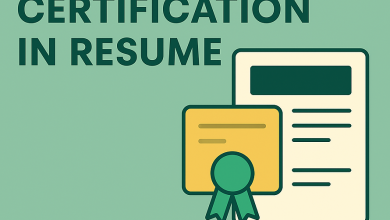How to Effectively Showcase Certifications on Your Resume
Earning certifications undoubtedly demonstrates one’s commitment and offers concrete evidence of specialized expertise and skills. Incorporating such certifications into your resume can significantly enhance your job application, distinguishing you from the competition. This distinction is particularly vital in the contemporary job market, where showcasing specialized competencies can provide a considerable edge. For those who have obtained one or multiple certifications, it is crucial to comprehend the optimal occasions and strategies for presenting them on your job application.
In today’s digitalized professional environment, the significance of digital certificates has surged. These credentials, often awarded by reputable online educational platforms, cover a broad spectrum of skills—from technical proficiencies to complex analytical abilities. Integrating digital certifications into your resume is straightforward and efficient, typically involving a simple link to a digital badge or a professional certification repository. This ease of inclusion ensures that potential employers can quickly verify your credentials with just a click, enhancing the credibility and attractiveness of your application. Demonstrating your engagement with ongoing digital education and your adaptability to evolving industry norms can significantly distinguish your resume from a pool of candidates.

Possessing multiple certifications can greatly enhance your professional profile, but failing to showcase them properly can lead to missed opportunities. Properly highlighting your certificates on your resume can significantly bolster your job application, ensuring that potential employers notice and appreciate your qualifications. In this thorough guide, we will delve into the significance of certifications within job applications and illustrate the correct method for listing these qualifications on your resume.
What is a certification?
Certifications represent a crucial set of credentials that individuals acquire to validate their qualifications and capability to execute specific job functions effectively. These credentials are formal validations that affirm an individual has received targeted education and training pertinent to specific job roles and has successfully met predefined standards as required in various professions. A certification is typically manifested as an official document or digital badge, which confirms that the professional has undergone rigorous assessments and has satisfactorily demonstrated competence in a particular field. This official attestation is issued only after the individual has passed the necessary examinations or evaluations, which accredited third-party credentialing institutions administer.
The certification process involves a combination of theoretical learning and practical training designed to equip the individual with the necessary skills and knowledge required in their specific professional domain. Individuals looking to enhance their job prospects, gain promotions, or increase their day-to-day effectiveness in their current roles often pursue certifications. The acquisition of these credentials can be seen as a significant professional milestone that denotes credibility, dedication to one’s craft, and a commitment to ongoing professional development.
In many fields, particularly those involving technical expertise, healthcare, finance, and education, certifications are not merely beneficial but may be mandated by law or industry standards. They prove the individual’s ability to uphold professional standards and perform job duties safely and effectively. For employers, hiring certified professionals means investing in individuals who have been officially recognized as capable and knowledgeable, thereby reducing the risk associated with employment decisions.
Understanding When to Include Certifications on Your Resume for Maximum Impact
Several factors should guide your decision when contemplating whether to include certifications on your resume. Certifications can be pivotal in bolstering your job application, serving as proof of your qualifications and as a distinguishing feature that sets you apart in the competitive job market.
Validation of Industry Experience

Certifications are not merely formalities but profound validations of a professional’s sustained commitment and deep understanding of their industry. Earned through rigorous evaluations and extensive practical experience, these credentials act as benchmarks of expertise that employers highly respect. Particularly in fields where precision and advanced knowledge are crucial, such as engineering, healthcare, and IT, certifications serve as a testament to a candidate’s ability to perform specialized tasks effectively. By presenting these certifications on a resume, a candidate unequivocally communicates their long-term dedication and proven competence to prospective employers.
The strategic inclusion of relevant certifications on your resume also enhances your professional narrative. It demonstrates to hiring managers that you are qualified but continuously seek to advance your expertise and stay current in your field. For employers, this represents a significant reduction in training time and ensures that they hire a professional whose skills have been validated by trusted third-party organizations. Consequently, highlighting these certifications prominently, with details about the certifying body and the date of certification, bolsters your candidacy and aligns your professional trajectory with the needs and standards of potential employers, thereby making your application more compelling.
Mandatory Requirement by Employers
Including certifications on a resume is most crucial when a potential employer expressly mandates them. Many job positions specify particular certifications as essential qualifications, underscoring their importance as prerequisites for employment consideration. This direct requirement highlights the employer’s expectation for a foundational level of expertise and assurance that the candidate has been vetted and validated by recognized certifying authorities. Therefore, when a job description explicitly states that a certification is required, failing to list this on your resume could result in your application being overlooked, regardless of your other qualifications and experiences.
To effectively navigate these prerequisites, it is imperative to meticulously review the job listing and the employer’s official website to ascertain the specified certifications. This scrutiny ensures that you meet the explicit demands of the position and demonstrates your attentiveness and thorough preparation in the application process. By aligning your resume with the employer’s stated requirements, you significantly enhance your chances of advancing through the selection process. This detailed approach positions you as a compliant and serious candidate and maximizes the impact of your resume by directly addressing the employer’s specific needs and expectations.
Showcasing Additional Skills

Including certifications on your resume can significantly enhance your candidacy by showcasing additional skills that, while not explicitly required for the position, offer clear advantages to potential employers. For example, an A+ IT certification displayed on a resume for an administrative assistant role subtly communicates to employers that the candidate possesses advanced computer skills. Such certifications indicate a proactive approach to professional development and a commitment to acquiring relevant skills that exceed basic job requirements. By highlighting these certifications, candidates can differentiate themselves from others who may only meet the standard qualifications, thereby increasing their marketability and appeal to employers looking for multi-skilled employees.
This strategic presentation of supplementary certifications acts as a testament to a candidate’s broader competency and willingness to engage in continuous learning. For employers, it suggests that the candidate can handle additional responsibilities and adapt to technological advancements within the workplace. It also reduces the need for extensive training, as the candidate has already demonstrated proficiency in key areas through their certifications. As such, when candidates list relevant but not strictly required certifications, they align more closely with the potential future needs of the business and position themselves as versatile and valuable assets to the team.
Compensation for Limited Practical Experience
For individuals entering the workforce or pivoting to a new career, possessing relevant certifications can be a significant advantage, especially when practical experience is limited. Certifications prove expertise and dedication to the field, allowing candidates to demonstrate their commitment and preparedness for specific roles. This is particularly crucial for recent graduates or career switchers who might not have extensive hands-on experience but have taken proactive steps to gain relevant industry certifications. By showcasing these certifications on a resume, these candidates can effectively bridge the gap between their past experiences and the requirements of new job opportunities, making them more competitive candidates.
Moreover, certifications can provide a solid foundation for discussing one’s capabilities and enthusiasm during job interviews. They allow candidates to highlight how their certified skills align with the job’s demands despite a lack of extensive professional experience. For employers, this commitment to obtaining industry-relevant certifications can be a strong indicator of a candidate’s motivation and ability to adapt to new roles and environments quickly. Thus, for those looking to overcome the challenge of limited practical experience, emphasizing relevant certifications on a resume can be a strategic way to attract positive attention from potential employers and improve their chances of securing a job.
To Demonstrate Proficiency and Competency

Including certifications on your resume can be a strategic move even when they aren’t explicitly required for the position. Certifications that demonstrate proficiency and competency in relevant skills for the job can significantly elevate your application. For instance, certifications in project management or customer service, applicable across a variety of sectors, can make a candidate more attractive to potential employers. These credentials show that a candidate is capable of performing their duties and committed to excellence in their professional undertakings. This dedication to skill enhancement can set a candidate apart, offering a tangible competitive edge in the hiring process.
Moreover, showcasing such certifications is particularly advantageous in roles requiring high precision, regulatory compliance, or operational efficiency. For example, a quality management or compliance certification could be highly relevant in industries like manufacturing, healthcare, or finance, where such standards are critical. Including these certifications can reassure employers of a candidate’s ability to conform to industry standards and best practices, further solidifying their suitability for the role. This approach highlights a candidate’s specialized skills and underscores their broader understanding of the industry and its demands.
To Supplement Insufficient Work Experience
In scenarios where practical experience may be limited, certifications emerge as powerful tools to demonstrate a candidate’s capabilities and readiness for specific roles. This situation is particularly relevant for individuals venturing into new fields or those early in their careers who may not have had the opportunity to gain extensive on-the-job experience. Certifications act as evidence of a candidate’s commitment to their new field and their proactive efforts to meet industry standards. By acquiring and listing relevant certifications, candidates can significantly mitigate the potential drawbacks of limited work history, showing potential employers that they possess the necessary skills and knowledge to excel in the position.
Furthermore, certifications can help bridge the gap between theoretical knowledge and practical application, providing a foundation upon which candidates can build as they gain more hands-on experience. They serve as a testament to a candidate’s understanding of key concepts and their ability to apply them in real-world scenarios, which is often just as valuable as direct experience. For employers, a well-chosen certification on a resume signals a candidate’s dedication to professional growth and initiative in preparing themselves for the demands of the industry. This can make a decisive difference for candidates who are competing in a tough job market, enhancing their credibility and improving their chances of being selected for an interview or a role.
How to Effectively List Certifications on Your Resume

When deciding how to list certifications on your resume, consider their relevance to the job you’re applying for and their overall importance to your professional profile. Here’s a structured approach to ensure your certifications are presented effectively:
Choosing the Right Section for Certifications
You can create a dedicated section titled “Professional Certifications,” “Licenses,” or “Certifications and Training,” depending on what fits best. Alternatively, if your certifications are directly related to your educational qualifications, you might opt to combine them under an “Education and Certifications” section for clarity. This is particularly effective if the certifications are academic or if you are a recent graduate.
The placement of this section can vary:
- For experienced professionals: List certifications after your work experience but before your education section, especially if your certifications are not the primary qualification but still add value to your resume.
- For entry-level candidates: If certifications are your primary qualification or particularly strong selling points, consider placing them towards the top of your resume to immediately catch the employer’s attention.
Formatting Your Certifications on a Resume
When adding each certification, use the following format to ensure clarity and impact:
1. Title of Certification: Start with the full name of the certification. Include any common abbreviation in parentheses to ensure clarity for all potential readers.
2. Issuing Organization: Mention the name of the organization or the state that issued the certification. This detail adds legitimacy and allows potential employers to verify your certification if needed.
3. Date Earned: Include the month and year you obtained the certification. If it’s a certification that requires renewal, also mention the date of the last renewal to show that it’s current.
4. Expiration Date: If applicable, list the date when the certification expires. Always ensure that you do not list expired certifications unless you are currently in the process of renewal.
6. Details (optional): If space permits and it’s relevant, add a brief sentence describing how this certification is relevant to the job you’re applying for. This can link your certification directly to the job duties or requirements.
In the dynamic world of professional development, effectively showcasing your certifications on your resume is not just about listing your qualifications—it’s about strategically positioning yourself in the job market. Certifications can significantly amplify your credentials, making your resume stand out in a sea of candidates by highlighting your specialized skills and commitment to continuous learning. When arranging these certifications, it is crucial to consider their relevance to the position you’re applying for and to format them in a way that showcases your professional aptitude and readiness for the role.

For those looking to streamline this process and ensure their certifications are displayed prominently and professionally, Sertifier offers a modern solution. Sertifier allows recipients to receive verifiable and shareable digital badges and certificates, which can be effortlessly linked to resumes or professional profiles. Sertifier simplifies the management of credentials and enhances the visibility of your professional achievements, making it easier for employers to verify and appreciate the breadth of your qualifications. Embrace the convenience of digital credentialing with Sertifier, and make sure your certifications are not just seen but recognized.



